Honda Element AC not working (Troubleshooting Guide)
A malfunctioning AC system in your Honda Element can be bad especially when driving in extremely hot weather. Discomfort will set in quickly and you won’t be able to enjoy your ride. However, knowing what makes your AC malfunction and how to fix it will help ensure your air conditioning stays in top working condition at all times.
Honda Element AC not working can be caused by a variety of different issues outlined below:
- Faulty compressor
- Low or overcharged refrigerant
- Dirty or clogged cabin air filter
- Dirty condenser
- Dirty evaporator coils
- Blower motor issues
- Defective blend door actuator
- Bad fuse or relay
- Failing fan motor
In this article, we’ll discuss more comprehensive details about these causes of AC malfunction. We’ll also discuss the best solution to consider in each case and other helpful information related to Honda Element AC issues.
Why your Honda Element AC is not working

If your Honda Element AC is not working, the most common features to consider include:
Faulty compressor
One of the common reasons why your Honda Element air conditioning may stop working is due to a faulty compressor.
The compressor is a crucial component of your Ac tasked with pumping the refrigerant through your AC system.
Plus, it also converts refrigerant from a gaseous to a liquid state as it goes through the condenser.
If the compressor becomes faulty, your vehicle AC will only blow warm air.
Some of the reasons why your compressor may fail include insufficient lubrication, which makes its internal component wear and stop working.
Excessive amounts of oil in the refrigerant will also cause issues with the compressor’s performance—reduced cooling performance.
Sometimes, the compressor may fail without any good reason. For instance, it may fail in old vehicles or vehicles that have covered too many miles.
In some cases, a manufacturing defect will cause this component to fail.
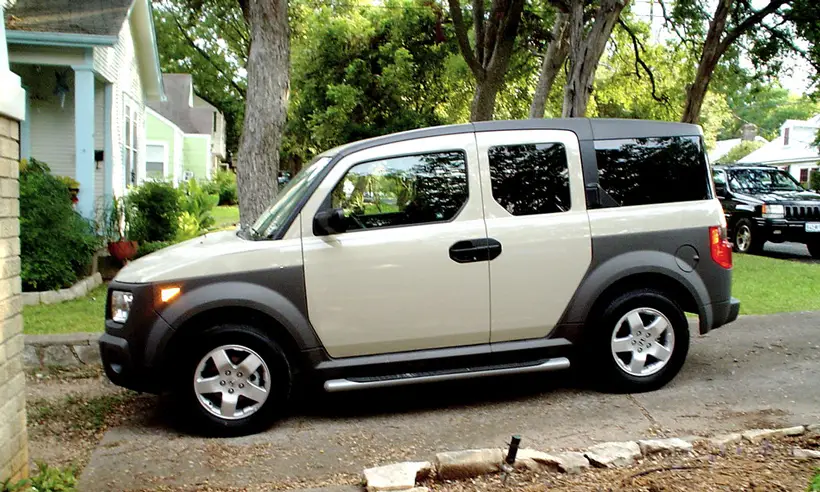
Solution: Once a compressor goes bad, it can’t be repaired. The only option you have is to replace it with a new one.
Low refrigerant levels
Low amounts of refrigerant in your vehicle is another common cause for your Honda AC malfunctioning.
The refrigerant levels can get low because of a leak or if you have not recharged your vehicle in years.
Small leaks are normal and may happen over time due to minor imperfections in your AC system. This is why recharging every few years is recommended to keep the refrigerant at the correct levels.
As such, if you stay for a long time without serving your AC system, the refrigerant will get quite low. And your system will lose its cooling capacity.
Solution: Check if your Honda Element refrigerant levels are low and have it recharged to continue enjoying a blast of cool air in your car.
If you notice the levels dropping low quite fast after a refill, you most probably have a leak.
In this case, you’ll need to engage a professional Honda technician to inspect your AC system for a leak and fix it to prevent further loss of Freon.
Overcharged refrigerant
Overcharged refrigerant is also not good for the proper functioning of your Honda Element AC system.
If you overcharged your system with refrigerant, you’ll not only compromise its cooling performance but also risk damaging the compressor. In some cases, a major leak may happen.

Solution: Check your refrigerant pressure by connecting a pressure gauge to the Low pressure port.
If the pressure reads higher than the recommended level, we advise you to let out some refrigerant.
Dirty cabin air filter
Another likely reason your AC system malfunctions is due to dirt buildup on your AC cabin air filter. The filter removes harmful pollutants, e.g. dust and pollen from the air you breathe when inside your car.
However, it may become dirty over time and this will easily reduce your AC’s overall cooling capabilities.
Moreover, a clogged air cabin filter puts a strain on the AC system as it makes it work extra hard. This can also increase your fuel consumption as it will also make the engine work harder. (Source).
Key symptoms of a dirty cabin air filter include an unpleasant smell inside your car and reduced airflow.

Solution: Clean the cabin air filter to improve its performance and ensure optimal AC performance. If it’s beyond cleaning, simply replace it with a new one.
To avoid this problem in the first place, be sure to replace your filter on time as recommended by the manufacturer.
This will ensure it won’t be clogged and cause malfunctioning AC issues in your Honda Element.
If you usually drive your car through dusty and polluted environments, you may consider replacing your filter earlier than the manufacturer recommends.
Dirty condenser
Your Honda air conditioning may also be malfunctioning due to a dirty condenser. The condenser sits at the front of your vehicle and releases heat from the refrigerant into the air.
However, its position makes it prone to grime, bugs, dirt, and other small particles building up on its surface or in the gaps between its mesh.
These affect its ability to efficiently release heat as less air tends to pass through its mesh. As a result, your AC will do a poor job cooling your cabin.
Solution: The best fix here is to clean the condenser. Note that you’ll first need to remove your car’s front bumper to access the condenser.
We recommend using a pressure washer (set to low pressure) to clean the condenser.
Dirty evaporator
If your AC evaporator is dirty, it will also cause reduced cooling performance in your vehicle. Some of the dirt and other airborne particles that pass through the cabin filter end up being lodged in the evaporator.
Over time, these particles may build up on your evaporator fins and thus block airflow through your evaporator. The result is reduced airflow in your car cabin and reduced cooling performance.

Solution: Clean the evaporator to see if it helps fix the issue. However, keep in mind that cleaning this part isn’t easy as you’ll need to remove the entire dashboard to access it. Therefore, we recommend letting a professional do it for you.
Dirty blower motor
The blower motor is another crucial component of your vehicle’s AC system. It’s tasked with blowing cold air through your AC vents.
Although most of the dirt and airborne particles get trapped in the air cabin filter, some of them still escape and land on the blower cage fins.
As they accumulate over time, they restrict proper airflow, resulting in reduced cooling performance.
In the event of too much dust accumulation on the blower fins, the spin cage may be thrown off balance and start wobbling.
This puts unnecessary strain on the blower motor and further reduces the cooling performance as well as the airflow. In some cases, it also causes unusual noise from your vehicle dash.
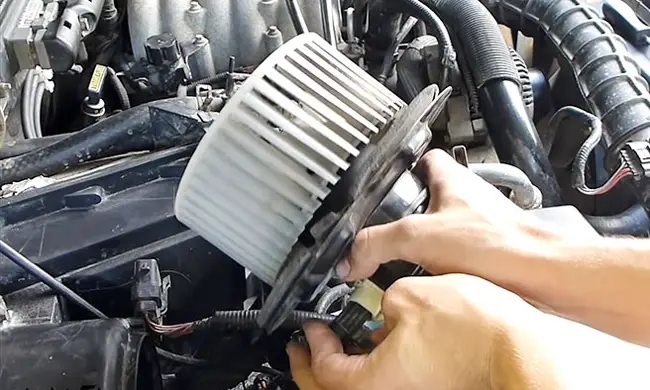
Solution: Check the condition of your blower motor. It is usually located under the dash on the passenger side.
If the moto looks dirty, simply clean it with the help of a brush to see if your AC will resume normal functioning.
Be sure to clean surrounding components such as the housing and wheel to ensure optimal airflow.
Sluggish blower motor
A sluggish motor will be struggling to spin at its expected speed, causing poor air circulation in the cooling system.
Potential culprits for a sluggish motor include worn bearings, debris accumulation, motor age, regular wear, or even electrical issues.
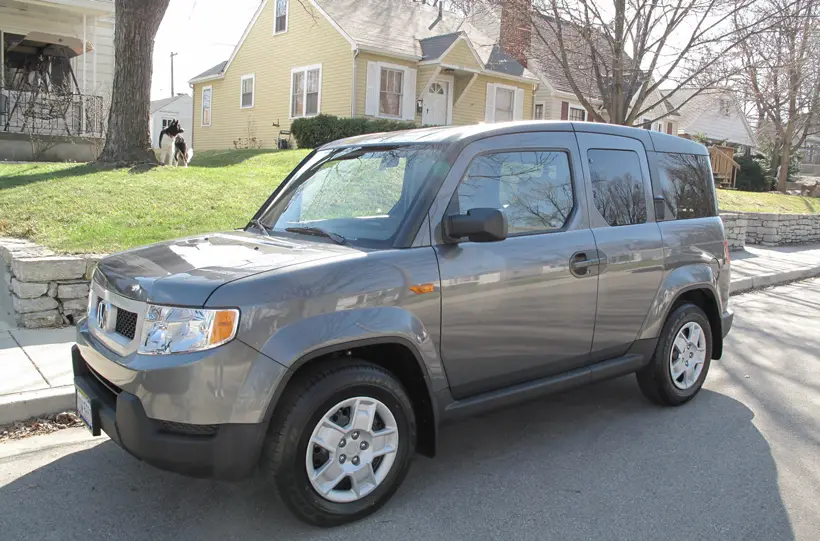
Solution: To troubleshoot a sluggish motor, you’ll need to inspect it for signs of wear, debris accumulation, etc.
If the motor looks severely damaged or worn, consider replacing it with a new one. However, if it’s just clogged with debris, carefully clean it to promote optimal airflow.
Also, verify that all its electrical connections are secure and in good working condition. Test the motor capacitor’s condition and replace it if necessary for optimal motor performance.
Clogged expansion valve
A clogged expansion valve, or orifice tube, may also stop your Honda Element air conditioning from functioning correctly.
This valve usually regulates the refrigerant flow into the evaporator, where it then undergoes a phase change to help cool the air.
If this valve is clogged, it won’t allow proper flow of the refrigerant. This causes reduced cooling efficiency of your AC or no cooling at all!
The clogging can be caused by the presence of debris and other contaminants, e.g. metal chips from a failing compressor in the system.
Solution: To troubleshoot this issue, you’ll need to get a qualified Honda technician to inspect and clean your expansion valve.
This will help restore the proper flow of the refrigerant and allow the AC to cool air in your cabin efficiently.
If cleaning won’t help, the professional may recommend replacing the valve with a new one.
Defective blend door actuator
A bad blend door actuator will also cause issues with your Honda Element air conditioner. The work of this part is to control temperatures and airflow inside your vehicle.
If you notice issues with consistent temperature and airflow, then you probably have a defective blend door actuator.
One side of your vehicle may feel hot while another side feels cooler because of a bad actuator.
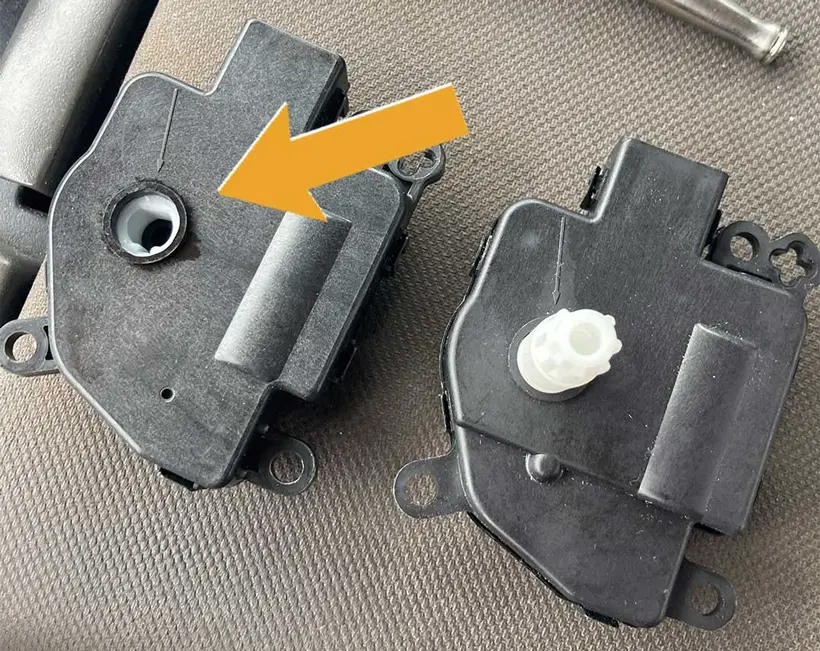
The most common sign of a malfunctioning actuator is a knocking sound (just like the sound of someone knowing the door).
You may also hear a repeated clicking sound coming from under your vehicle dash. This sound may be more prominent when you first turn on your AC or adjust the temperature.
Solution: Once a blend door actuator malfunctions, it can’t be repaired, so the best fix here is to replace it with a new one.
Owing to the complexity of the replacement process and the need to recalibrate the actuator after replacement, we recommend getting a professional for this job.
Bad fuse or relay
If your AC fuse is blown or bad, it may also cause issues with your AC system. A bad fuse may cause your AC to fail to turn on. Likewise, a bad AC relay will affect proper AC functionality.
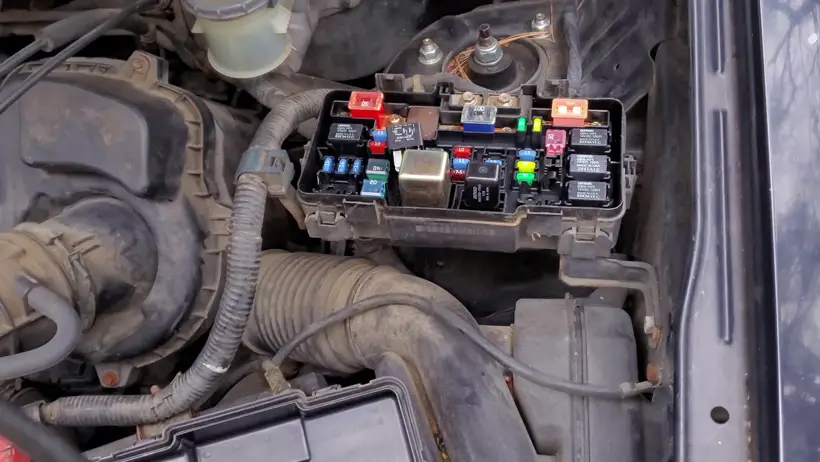
Solution: Check all the fuses and relays related to your vehicle AC (consult your owner’s manual on the exact location of these fuses and relays).
If the Honda element AC fuse is blown, simply replace it with a new one that has the same amperage rating as the old one.
As for the Honda element AC relay, consider swapping it with another one meant for different functions e.g. headlights to see if the AC will work.
If it does, it means the relay is malfunctioning and needs a replacement.
If your Honda Element’s AC system is giving you trouble and you’re looking for solutions, it’s worth exploring similar issues that might affect other Honda models. Problems with the AC not working can also arise in models like the Honda Odyssey and Honda Pilot. Our articles on Honda Odyssey AC not working and Honda Pilot AC not working provide valuable insights into diagnosing and addressing AC-related concerns specific to these vehicles. Understanding common problems such as refrigerant leaks, compressor issues, or electrical malfunctions can assist you in making informed decisions regarding necessary repairs.Conclusion
Many different issues can cause your Honda Element to stop working. These include a faulty compressor, low refrigerant levels, overcharged refrigerant, dirty cabin air filter, blocked evaporator, dirty condenser, dirty or sluggish blower, clogged expansion valve, defective blend door actuator, blown fuse, or Honda AC relay problem.
When diagnosing your AC system, we advise you to start with simple issues such as low refrigerant levels, fuses, relays, etc. If you’re unable to diagnose your AC system by yourself, consult a professional mechanic specializing in Honda vehicles for assistance.






